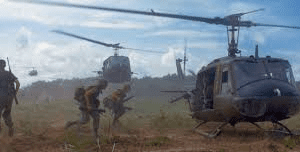The Real Lessons of Vietnam — and Afghanistan By James E. Wright (defenseone.com) / Oct 13 2017
As the Trump administration reshapes American strategy, they should look to history for guidance, yet understand that it offers no blueprint.
For some fifty years, politicians and pundits have shouted out “lessons of Vietnam” to clinch any number of policy arguments. Yet the actual lessons offered are seldom unambiguous, and can even be contradictory. Such “lessons” have been deployed, for example, to support and oppose the whole range of approaches to Afghanistan and Iraq. Ironically, one of the most compelling lessons of Vietnam –and of history in general — is to be wary of those who claim that history has informed them how to proceed.
President Lyndon Johnson and others of his World War II generation insisted that they had learned from history not to ignore aggression, not to concede to a bully — the Munich Lesson. So they developed rationales from what they considered the mistakes of World War II—and devised their own mistakes. Their “lessons” were untouched by an understanding of nuance and difference—and by the recognition that leadership requires more than assuming roles prescribed by history.
In his Sept. 19 speech to the United Nations, President Donald Trump promised “a new strategy for victory” in Afghanistan. As he and the Congress shape this strategy, hopefully they will look to history for guidance. And hopefully they will appreciate that history is not a blueprint.
Afghanistan in 2017 is not Vietnam in 1954 or 1965. Despite some Chinese and Russian and Iranian mischief, these nations do not have the role in Afghanistan that China and the Soviet Union had in Vietnam. Afghanistan has no equivalent of the large, well-trained and modestly well-equipped North Vietnamese Army. Indeed, it has no equivalent of North Vietnam. Pakistan is far more consequential diplomatically and militarily than were the staging and storage areas along the Ho Chi Minh Trail in Laos and Cambodia. And the Taliban are assuredly not the National Liberation Front in size, organization, or capacity. Afghanistan remains a dangerous nurturing ground for international terrorist groups; it is not part of a broader Cold War contest.
Nonetheless, we can learn some things from Vietnam (and from 16 years in Afghanistan):
- Among the great tragedies of Vietnam was that American leaders, including Presidents Kennedy, Johnson, and Nixon, had serious private reservations about their commitments even as their public statements promised success. The difference in Afghanistan is that President Trump’s reservations, like those of President Obama, have been publicly expressed.
- War is more than a weapon in a diplomatic game. And it is not as flexible to reorient as diplomatic initiatives are. Wars are easier to start than to end, to escalate than to draw down. The human consequences endure.
- The goals set for the military must be unambiguous and they should be military in nature. Remember, U.S. armed forces had accomplished their original goals in Afghanistan by November 2001 and in Iraq by May 2003 (“Mission Accomplished”). But then the military goals evolved into important civic ones: We would modernize the government, education, and the economy, especially agriculture.
- Congressional and public support is essential—and it is mercurial. It is far easier to elicit this at the outset of a military engagement than it is to sustain it. Clear statements of purpose, candid assessments of likely costs, and as much transparency as is militarily possible are crucial. If these are insufficient to sustain support, then our democracy makes the next step clear.
- In a democracy, all citizens should have a stake in the war—as George Washington said, either through their service or their treasure. Or both.
- Make certain the local government we are defending is defensible, morally as well as politically. And that it is capable of playing a major role in its own defense.
- Be cautious when generalizing about the inhabitants of a country, of fitting them or their own conflicts into presumptive Western ideological or cultural categories. They have their own histories and cultures, their own memories and ambitions.
- Seeking to win hearts and minds may be hyperbolic overreach, but securing the trust of local population is critical. Excessive military force can be counter-productive in this effort. When liberators or benefactors become occupiers, relationships change markedly. It is not good to be perceived—or to enable your opponents to identify you —as another colonial or occupying power, especially in places that have had much experience being colonized or occupied.
- War is a tragic human enterprise. It requires a commitment of a country’s most treasured resource. The modern “Boots on the Ground” slogan abstracts the enterprise and substitutes shoe leather for the flesh and blood cost of war. Especially in rural, non-industrial countries, fighting requires combat troops on the ground, which means casualties.
- Making certain our young did not die in vain usually results in more of our young dying. Potentially in vain.
- Handing the warfighting over to the indigenous allies (“Vietnamization”) is a complicated transaction that requires patience and understanding—and loss of control. If it is a cover for an exit strategy, its failure is pretty much inevitable
- Never confuse the warfighters for the war. Honor and care for them.
President Trump promised victory in Afghanistan just as Lyndon Johnson pledged to “hang the coonskin on the wall.” But there is no conventional victory in wars marked by negotiations, by strategies to outlast rather than traditionally defeat an enemy. Repetitious small-unit skirmishes, patrols, and ambushes are not concluded by epic flag-raisings. They are, in fact, generally repeated more than concluded. Such wars will likely end with political compromise and unmet goals, with weary relief more than symbolic coonskins or real victory parades. And the relief — the “peace with honor” of Vietnam, the “Armistice” in Korea — may well prove temporary.
http://www.defenseone.com/ideas/2017/10/real-lessons-vietnam-and-afghanistan/141742/?oref=d-river



















